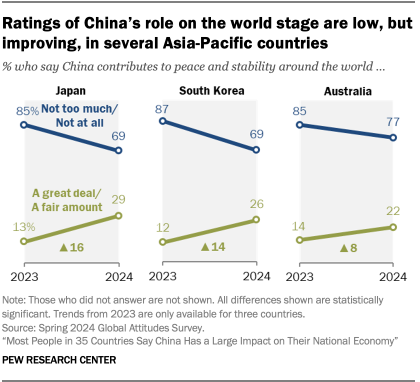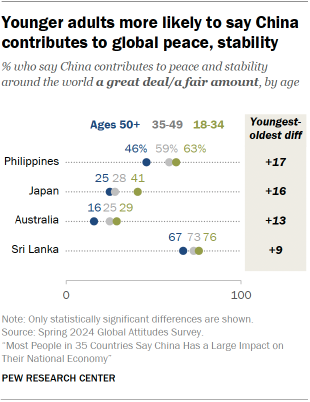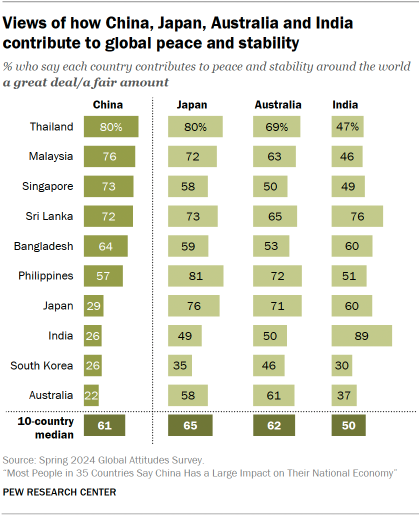As the largest economy and military in the Asia-Pacific region, and the second-largest population in the world, China is an important regional and global player. To learn more about views of its impact in the region and more broadly, we asked adults in 10 Asia-Pacific countries the following questions:
- “How concerned are you, if at all, about territorial disputes between China and neighboring countries?”
- “In general, to what extent do you think China contributes to peace and stability around the world?”
A 10-country median of 72% are concerned about territorial disputes, while 61% say China generally contributes to global peace and stability. However, opinions both across and within countries are mixed.
Concerns about China’s territorial disputes with its neighbors
There are concerns across the Asia-Pacific region about China’s territorial disputes with neighboring countries.
In the Philippines, 91% are concerned – the highest share of the 10 countries where we asked about this – including 65% who say they are very concerned. The survey was conducted during early 2024, which saw developments in the country’s dispute with China over territory in the Spratly Islands, a conflict that dates back to the 1970s. (Since fielding, the conflict has flared up over a collision in the area between Chinese and Philippine ships.)
More than eight-in-ten in Australia, Japan and South Korea share concerns about China’s territorial disputes with its neighbors.
In India – where there is a long-standing border dispute with China over parts of the Himalayan region – 69% of adults are concerned, including 44% who are very concerned.
Thai adults stand out for their lack of concern: 61% are not worried about territorial disputes between China and neighboring countries.
Americans, for their part, are also concerned about China’s disputes in the region. About six-in-ten U.S. adults say they are very or somewhat concerned, an opinion especially common among older adults and conservative Republicans.
Views over time
In India, Japan, the Philippines and South Korea, we fielded this question in 2015 as well. In each country, majorities were concerned then and remain so now. Concern is up 9 percentage points in South Korea and 7 points in India. In Japan and the Philippines, there was no significant change in the overall shares who express concern between 2015 and 2024, though in the Philippines, the share who are very concerned increased 9 points over this period.
Evaluations of China’s contributions to global peace and stability
A median of 61% across the 10 Asia-Pacific countries surveyed say China contributes to global peace and stability a great deal or a fair amount. A 33% median say China does not make such contributions much or at all.
Evaluations on this measure are most positive in Thailand, where 80% see China as contributing to peace and stability. Majorities throughout the Southeast Asian countries surveyed agree.
In Australia, India, Japan and South Korea – the region’s four largest economies behind China –much smaller shares say China contributes to peace and stability. Fewer than three-in-ten hold this view in each of the four countries. And in Australia and India, about four-in-ten say China does not contribute to global peace and stability at all.
Views over time

When we asked this question in 24 countries in 2023, adults in Australia, Japan and South Korea were some of the least likely to believe China contributes to global peace and stability. Though still largely critical, ratings on this measure are up significantly from last year in those three countries.
Take Japan as an example. Following a somewhat rare meeting between the Japanese prime minister and Chinese president in November, the survey finds that 29% of Japanese adults think China contributes at least a fair amount to peace and stability around the world, up from 13% in 2023.
Views by age

In about half the Asia-Pacific countries surveyed, adults ages 18 to 34 have a better impression of China’s international behavior than those ages 50 and older. The difference is largest in the Philippines, where 63% of younger adults think China contributes to global peace and stability a great deal or a fair amount, compared with 46% of Filipinos 50 and older.
Views by perceptions of China’s economic influence
Respondents’ evaluations of China’s influence on their own country’s economy (as analyzed in Chapter 2) also impact their assessments of China’s contributions to global peace and stability. Those who say China has a sizable positive influence on their economy generally give more favorable ratings of its contributions to global peace and stability than those who see a sizable negative influence.
In Bangladesh, for example, 85% of those who see a great deal or fair amount of positive influence on their economy say China contributes to peace and stability around the world. Meanwhile, 62% of those who see a similarly sized negative influence on Bangladesh’s economy agree.
How do China’s contributions to peace and stability compare with other regional powers?

In addition to asking how much China contributes to peace and stability around the world, we also asked how much Australia, India and Japan do the same.
In six of the 10 Asia-Pacific countries surveyed, majorities say China contributes to global peace and stability at least a fair amount. But in four – Australia, India, Japan and South Korea – no more than about three-in-ten hold this view. In these countries, ratings of China as a contributor to global peace and stability are the lowest of any regional power we asked about.
Japan gets the highest median rating on its contributions. Majorities in eight countries think Japan contributes to peace and stability at least a fair amount.
A median of 62% say Australia contributes to global peace and stability, similar to the medians for Japan (65%) and China (61%). Australia’s highest ratings come from adults in Japan, the Philippines and Thailand, where roughly seven-in-ten hold this view.
India gets the lowest median rating on this measure (50%). Still, among Indians themselves, 89% believe their country contributes to global peace and stability. And about three-quarters in neighboring Sri Lanka agree.




